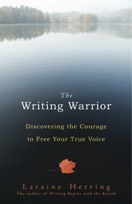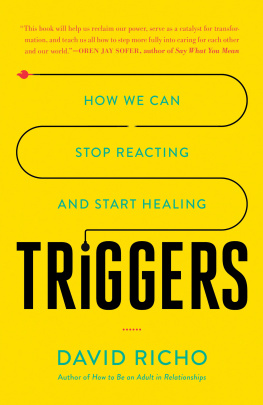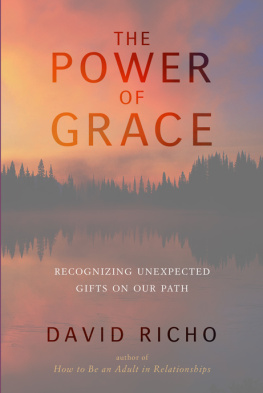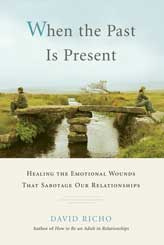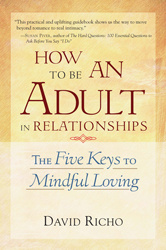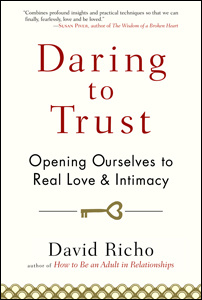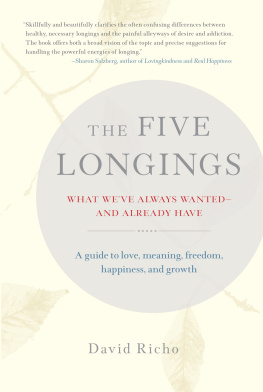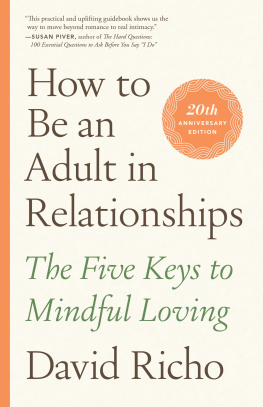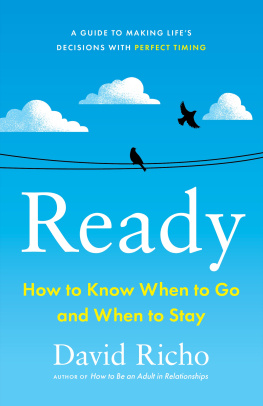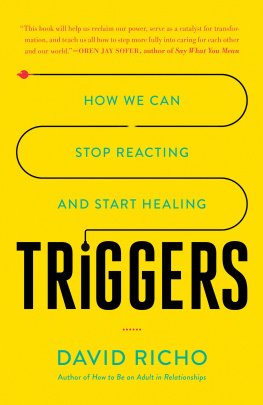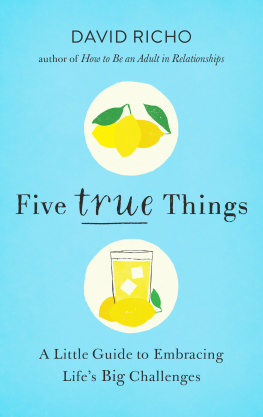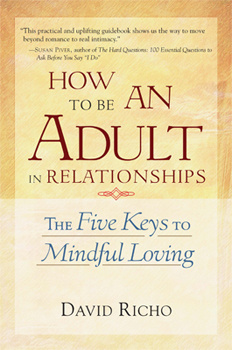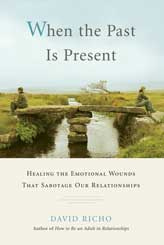Fascinating. Richos comments on reading poetry are well worth savoring.
SpiritualityandPractice.com
ABOUT THE BOOK
Psychotherapist David Richo offers a fresh and inspiring approach to personal growth: we can use the process of writing and reading poetry to move toward greater self-understanding and emotional healing. Even if youve never written a poem before, you can learn to use poetry to explore your feelings, your relationships, your childhood, your dreams, and more.
Richo explains how the creative, intuitive process of making poetry can help us gain access to our deepest truths, leading us to make connections and explore experiences in a new way, beyond the constraints of everyday language. This book offers a range of practical exercises for getting started, as well as guidance on how to read poetry in a way that can be personally transformative.
Being True to Life shows us that poetry is not reserved for a few specially talented individuals but is a deeply human activity that anyone can tap into for greater clarity and insight into lifes struggles, beauty, and mysteries.
DAVID RICHO, PhD, is a psychotherapist, teacher, writer, and workshop leader whose work emphasizes the benefits of mindfulness and loving-kindness in personal growth and emotional well-being. He is the author of numerous books, including How to Be an Adult in Relationships and The Five Things We Cannot Change. He lives in Santa Barbara and San Francisco, California.
Sign up to learn more about our books and receive special offers from Shambhala Publications.

Or visit us online to sign up at shambhala.com/eshambhala.


SHAMBHALA
Boston & London
2010
SHAMBHALA PUBLICATIONS, INC.
Horticultural Hall
300 Massachusetts Avenue
Boston, Massachusetts 02115
www.shambhala.com
2009 by David Richo
The selections from Emily Dickinsons poems are reprinted by permission of the publishers and trustees of Amherst College from The Poems of Emily Dickinson, Thomas H. Johnson, ed., Cambridge, Mass.: The Belknap Press of Harvard University Press, copyright 1951, 1955, 1979, 1983 by the President and Fellows of Harvard College.
All rights reserved. No part of this book may be reproduced in any form or by any means, electronic or mechanical, including photocopying, recording, or by any information storage and retrieval system, without permission in writing from the publisher.
Library of Congress Cataloging-in-Publication Data
Richo, David, 1940
Being true to life: poetic paths to personal growth / David Richo. 1st ed.
p. cm.
eISBN 978-0-8348-2173-6
ISBN 978-1-59030-742-7
1. PoetryAuthorship. 2. Self-actualization (Psychology) I. Title.
PN1059. A9R53 2009
808.1dc22
2009010594
For my poetry teachersthe provocateurs, the guidesNeil Topitzer, Father Jim Conefrey, Louis Mattutini, Mark Ferrer, Donald Pierce, Ed Smallfield, Jim Wilson, Wendy Larsen, and Emily Dickinson
You blessed me with the gift I can keep opening
Introduction
The Healing Power of Poetry
A poem begins in delight... and ends in a clarification of life... a momentary stay against confusion.
ROBERT FROST
This book is based on the captivating and delightful idea that writing a poem can be a powerful tool for self-discovery and healing. In writing a poem about something that touches us we access parts of ourselves, our feelings, and our motivations that other types of language or exploration often leave hidden. Reading or hearing a poem can open us to new depths of understanding. In both writing and reading poetry we are opening to our own truth and processing it in such a way that healing and liberation can result. Indeed, poetrylike psychological work or spiritual practicecan help us explore and deeply understand who we are and what we are here for.
In childhood we may have been given the gift of an Erector Set or a dollhouse. We learned how to enjoy these gifts and we gained many skills by using them. In school, when we memorized the times tables, we gained information for future use. However, if we were lucky enough to be exposed to poetry by a thoughtful teacher and came to appreciate it, something much more powerful was going on than the gaining of skill or information. In reading it, we were reaping the wisdom of the ages. In writing it, we were using a tool to record and process our experiences so that meanings in them not accessible by mere thought could be revealed. The message of this book is that the power and wisdom of poetry is still available to us, whether we think of ourselves as poets or not.
Poetry may seem intimidating to many of us, perhaps due to our experiences having to analyze or memorize it in school. But writing a poem as part of a process of growth and healing can be intriguing and highly satisfying. Such poetry opens us up to the richness of our inner world and connects us to others, our readers.
Writing poetry to express what we are feeling, to celebrate an occasion, to show appreciation, or to follow any lead of creative imagination is a long-standing practice throughout human history. Events that fascinate or frighten us take us by the hand into valuable self-exploration. This book is intended to help you find the uncultivated poetic talents in yourself for just such an exciting journey. You may believe you have no poetic skill, yet anyone who can write words can compose a poem, just as anyone who can talk can sing and anyone who can move can dance.
In this book, we are reconnecting poetry to its healing and spiritual roots. We are discovering that there is poetry in our souls and it is located right where our growth is. We are hearing the poems of others as messages from the soul of humanity. Indeed, when we read poetry with attentiveness, it becomes a Lectio Divina, a divine reading, a contemplative openness to the revelations that keep coming through to us.
Composing poetry is both a psychological and a spiritual event, because the requirements for writing a poem are like those of psychological and spiritual progress. We must learn to live in the moment. We see them in new ways and focus on what is significant. We expand our freedom of imagination. We locate the many voices within us, realizing we are more than our ego. We hear and express the music and rhythms of the natural world.
In using poetry as a tool for growth and healing, we write in our own way and on any theme. We do not have to write perfectly or for publication. We accept imperfection in our craft. In fact, we write with more confidence when we are not insisting on achieving an ideal. Our only purpose is to put something on paper and then use our skills to work with it so that it says best what we feel, what we perceive, what we are passionate about. In true passion, we are not in control. Paradoxically, this surrender to what arises from within us makes us less self-conscious and more open (which are also aspects of psychological and spiritual growth). We are all already poets in the depths of ourselvesas our image-filled and wildly imaginative dreams show us!
What Is Poetry?
A poem is
a party of
Picture words
an itch for rhythms
in the shy verandah light
Come anytime,
Rowdy to recite,
Tune-drawn
It wont be a big bash
like at the bar down the street
only we few desperadoes of excess,
Next page
